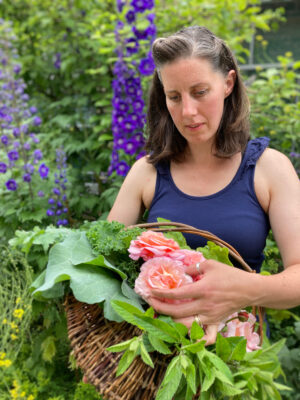The Plant Lover’s Backyard Forest Garden
Trees, Fruit & Veg in Small Spaces
Grow your own beautiful multilayered food forest in your own backyard.
Pippa Chapman is an RHS trained gardener who designs, plants and maintains abundant, biodiverse, edible and beautiful forest gardens. In The Plant Lover’s Backyard Forest Garden, she shares her practical tips for realistically transforming your own plot, whatever its size, and with limited time, money and resources. A forest garden doesn’t have to be big; you can grow a productive edible paradise in pots and containers too.
Pippa explains how to create multiple layers on a small-scale to maximize your growing area, using polycultures and guilds for healthy, low-maintenance food. She shares how to use perennials for structure, year-round food, and incorporate flowers for beauty, wildlife and the kitchen.
Chapters on permaculture design and forest gardening give practical advice:
- How to plan and plant your own garden, with guilds and plant profiles to give real-life
examples to help you get started. - Useful tips on propagation and seed saving to help keep plant costs low.
- A handy chapter on the soil-food web to help you understand your own soil and how to keep it healthy.
Reviews and Praise
"This beautifully illustrated book is full of practical wisdom, but is never prescriptive, and there is plenty of emphasis on how the principles of forest garden design can be tweaked and adapted to suit your own needs and circumstances."—Graham Burnett, permaculture teacher and author of The Vegan Book of Permaculture
More Reviews and Praise
"If you dream of planting a forest garden but lack the space and know-how, this is the book for you. Pippa uses her vast practical knowledge of forest gardening and permaculture to show you how to create a garden that is both productive and beautiful. From planning to harvest, Pippa explains how to pack in the produce while also working with nature to produce a low maintenance haven for you, your family, and the wildlife that will become part of it."—Steve Ott, editor of Kitchen Garden magazine
"An inspiring and informative guide perfect for the aspiring food forest gardener. Pippa's expert advice speaks to both those who are just starting their permaculture journey as well as more experienced growers. She also shows that you don't need a large garden to create a beautiful and productive edible landscape."—Tanya Anderson, author of A Women's Garden
"A beautifully clear guide to using the principles of forest gardening on a garden scale that perfectly balances the practical and inspirational with Pippa's personal experience."—Mark Diacono, food writer, grower, photographer and cook
About The Author
| Pages: | 180 pages |
| Book Art: | Color photographs throughout |
| Size: | 7.4 x 9.7 inch |
| Publisher: | Permanent Publications |
| US Pub. Date: | February 7, 2023 |
| Paperback: | 9781856232876 |
Available In/Retail Price
Paperback, 180 pages, $22.95USDMEDIA & EVENT INQUIRIES
Media Inquiries:
Contact Publicity at: [email protected] or (802) 295-6300 x 127
Event Inquiries:
To set up an author appearance or event contact Darrell Koerner at [email protected]
Review Copies:
Click here to request a review copy of one of our books.
Rights & Permissions
Email us for rights & permissions inquiries.
SALES CONTACTS
Special, Corporate and Academic Sales
Darrell Koerner
[email protected]
(303) 963-5612
Trade and Library Sales
Kirsten Drew
Book Strategy Manager
[email protected]
Independent Bookstore Sales
To place a retail wholesale order, please contact the appropriate regional representative.
Canadian and Overseas Trade Distribution
To place an international wholesale order, please contact the appropriate foreign trade distributor.
Academic Kit
Request a desk or evaluation copy.



